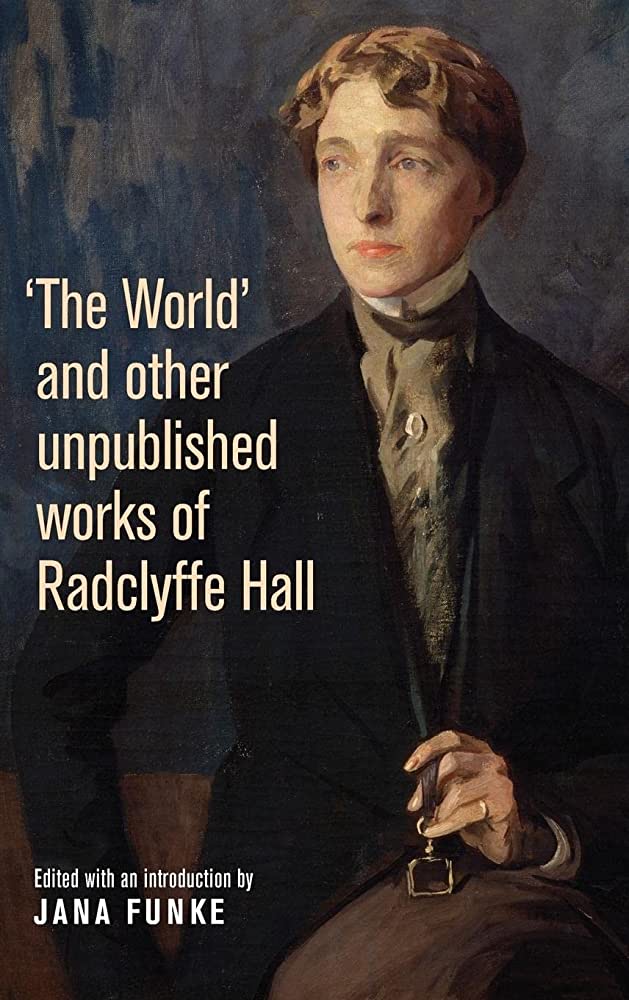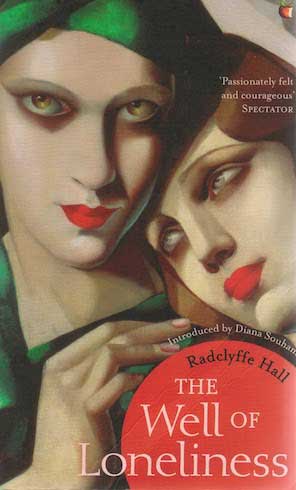Radclyffe Hall, Author of The Well of Loneliness
By Nava Atlas | On August 30, 2019 | Updated July 26, 2024 | Comments (0)

Radclyffe Hall (August 12, 1880 – October 7, 1943), British novelist and poet, is remembered as the author of groundbreaking lesbian literature; her most enduring work is the controversial 1928 novel The Well of Loneliness.
Hall’s struggles with love and gender identity worked their way into her fiction and contributed to a complicated, often unhappy life. (photo at right courtesy of Wikimedia Commons)
Born in Bournemouth, Hampshire, Marguerite Radclyffe Hall’s father was a wealthy Englishman with the unusual moniker Radclyffe Radclyffe-Hall, and her mother, Mary Jane Diehl, was American.
Her parents’ marriage fell apart when she was quite young due to her father’s continuous philandering and her mother’s mental instability. Her mother’s remarriage to a professor of singing was also fraught with conflict, and young Marguerite was largely ignored.
Gender identity
Hall described herself as a “congenital invert,” referring to an innate characteristic. The term comes from early 20th-century sexologist Richard von Krafft-Ebing and refers to a type of inborn gender reversal where women could be born with a masculine soul and vice versa.
Although Hall had long been described as a lesbian, it’s possible that she would have identified a transgender man if that concept had been known during her time.
She continued to call herself “John” after being given the nickname by her early lover, Mabel Batten. Hall nearly always dressed in suits and other men’s attire and used masculine notions to self-describe.
The Well of Loneliness is considered a trailblazing work of LGBTQ literature, though it has been criticized in some circles for portraying lesbian relationships as a rather heteronormative light.
One can assume that Hall was using the protagonist to portray her own sexuality and gender identity in her most famous novel, as she writes about wearing masculine clothing, having a masculine physique, and displaying masculine body language.
Hall’s gender identity and love life informed her literary work. Given what we now know, it seems almost disrespectful to use the pronouns “her” and “she,” but since Hall has long been known in female terms, it would also seem odd to switch to masculine pronouns and perhaps confusing, in this context to use the more neutral “they” and “them.”
So it is with apologies to the memory of Radclyffe Hall that we continue with the feminine pronouns.
. . . . . . . . . . .

. . . . . . . . . . .
Education and early works
Hall attended King’s College in London and afterward attended school in Germany. It was during these years that she began writing verses, which went on to be collected into five volumes of poetry in the first two decades of the 1900s.
Twixt Earth and Stars (1906) and A Sheaf of Verses: Poems (1908) were among the first. One of her best-known poems, The Blind Ploughman, was set to music by Coningsby Clarke.
Love affairs
In 1907, Hall met Mabel Batten in a spa in Germany. At the time, Hall was twenty-seven and Batten was fifty-one, with a husband, daughter, and grandchildren. They fell in love, and after the death of Batten’s husband, the two committed to each other. During their relationship, Batten gave Hall the nickname John. She preferred this name for the remainder of her life.
In 1915, she fell in love with Batten’s cousin, Una Troubridge, a sculptor and wife of Vice-Admiral Ernest Troubridge. Within a year, Batten had passed away. Hall had her corpse embalmed with a silver crucifix on it that was blessed by the pope.
She then moved in with Troubridge, despite the Church’s views on same-sex relationships. They lived in Kensington, London, and stayed together until Hall’s death.
Throughout Troubridge and Hall’s relationship, there were many other love affairs. For one, she fell in love with Evguenia Souline, a Russian émigrée, and had a long-term affair with her. Troubridge was aware of this affair and tolerated it, though not without pain.
. . . . . . . . . . .

. . . . . . . . . . .
First successes and a major literary prize
Much of Radclyffe Hall’s literary reputation rests on her best known novel, The Well of Loneliness, but her earlier books enjoyed a slew of successes in the years just preceding its publication. These included the novels The Forge, The Unlit Lamp, and Adam’s Breed.
Following, a story in an American publication called the Independent Record (February 4, 1927) announces her winning a major literary prize called the Femina Prize, and outlines some of her background:
“This year’s award of the famous Femina Vie Heureuse prize, which is given each year by the leading French women’s magazine to the woman author of the best English novel published during the past twelve months, is of special interest to Americans.
The winner, Miss Radclyffe Hall, whose novel, Adam’s Breed, was published by Doubleday, Page and Company in 1926, is half American. Her book was entered in competition with Sylvia Townsend Warner’s Lolly Willowes and Liam O’Flaherty’s The Informer.
Radclyffe Hall is the daughter of an English father and an American mother. While she has always made her home in England, she has spent much time in the U.S. Adam’s Breed, the novel which received this distinguished recognition in France, was her first to be published in America. It was her fourth to appear in England.
She received her first encouragement from the late William Heinemann, whose firm became her publishers. He was so interested in her early stories that he urged her to write a novel and promised to consider it for publication. Although he didn’t live to see his prophecy fulfilled, it was her wish to justify his faith in her. That kept her at work for three years on a first novel, The Unlit Lamp, which won her some reputation in London.
The tall, rather sever, exquisitely tailored Hall, with her hair cut close and brushed smoothly back from a face of almost Greek perfection in outline, looks anything but a sentimentalist. And her books will amply justify her appearance. But she confesses with amusement that at the tender age of three, she was a rank sentimentalist, bursting into lyrics before she knew how to spell.”
. . . . . . . . . . .
. . . . . . . . . . .
The Well of Loneliness
Hall’s most famous work, The Well of Loneliness (1928), features a lesbian from an upper class family in England. The main character, Stephen Gordon, lives in isolation with her partner Mary Llewellyn. They journey through a lesbian relationship during an era that rejected this expression of sexuality poses the setting and plot of the novel.
Receiving pushback from critics for her “sexually deviant” novel, Hall was swept into legal battles. Though at first widely banned, its notoriety helped push the narratives of lesbians in Western literature to the forefront. Hall made it clear to her publisher that she wanted the original text published, declaring:
“I have put my pen at the service of some of the most persecuted and misunderstood people in the world … So far as I know nothing of the kind has ever been attempted before in fiction.”
Surprisingly, The Well of Loneliness received more liberal treatment in American courts than it did in England. Justices dismissed charges of violation of Section 1141 of the Penal Law against Covici-Freide, Inc., American publishers of the book. The Court said:
“The book in question deals with a delicate social problem, which in itself cannot be said to be in violation of the law unless it is written in such a manner as to make it obscene, lewd, lascivious, filthy, or indecent, and tends to deprave and corrupt minds open to immoral influences.”
After Hall’s death in 1943, the ban on The Well of Loneliness was eventually overturned on appeal. Although she was vindicated by the American verdict, she steered clear of equal controversy in her subsequent literary works.
. . . . . . . . . . .

Quotes by Radclyffe Hall
. . . . . . . . . . .
Other Awards and Honors
Hall was given the Gold Medal of the Eichelberger Humane Award in 1930. She was listed at number sixteen in the top 500 lesbian and gay heroes in The Pink Paper.
In 1930, Hall received the Gold Medal of the Eichenberger Humane Award. She was a member of the PEN club, the Council of the Society of Psychical Research, and a fellow of the Zoological Society.
Radclyffe Hall died of colon cancer in England at the age of 63 in the tiny town of Rye, East Sussex. She is buried at Highgate Cemetery in North London in the chamber of the Batten family, which includes Mabel, one of Hall’s early lovers.
More about Radclyffe Hall
On this site
- The Well of Loneliness: Banned and on Trial for Obscenity
- Quotes by Radclyffe Hall
- How to Burn a Book: Radclyffe Hall’s The Well of Loneliness
Major Works
Novels
- The Forge (1924)
- The Unlit Lamp (1924)
- A Saturday Life (1925)
- Adam’s Breed (1926)
- Miss Ogilvy Finds Herself (1926)
- The Well of Loneliness (1928)
- The Master of the House (1932)
- The Sixth Beatitude (1936)
Poetry
- Twixt Earth and Stars (1906)
- A Sheaf of Verses: Poems (1908)
- Poems of the Past & Present (1910)
- Songs of Three Counties and Other Poems (1913)
- The Forgotten Island (1915)
- Rhymes and Rhythms (1948)
Biographies
- Trials of Radclyffe Hall by Diana Souhami
- Radclyffe Hall: A Life in the Writing by Richard Dellamora
- Your John: The Love Letters of Radclyffe Hall by Joanne Glasgow
- Radclyffe Hall: A Woman Called John by Sally Cline
- Your John: The Love Letters of Radclyffe Hall by Joanne Glasgow
- Radclyffe Hall at The Well of Loneliness: A Sapphic Chronicle by Lovat Dickson
- Our Three Selves: The Life of Radclyffe Hall by Michael Baker
- Noël Coward & Radclyffe Hall: Kindred Spirits by Terry Castle
More Information

Leave a Reply